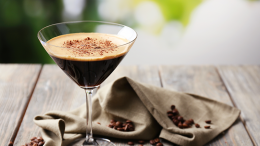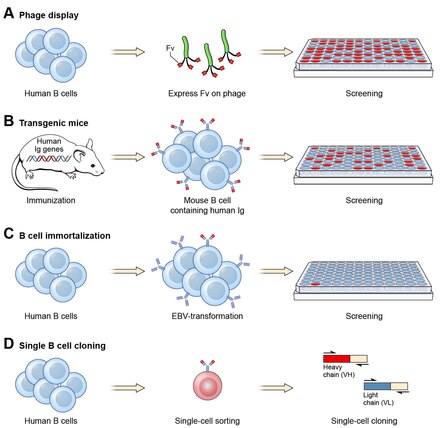
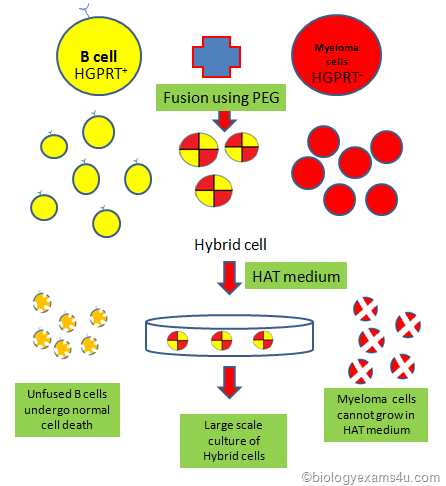 Itchy Throat: Could It Be COVID-19 or Something Else? To receive monoclonal antibodies for treatment, you must have a positive test for COVID-19, have symptoms of COVID-19 and be within 10 days of when your symptoms began. If you were treated for COVID-19 with monoclonal antibodies or convalescent plasma, you should wait 90 days before getting a COVID-19 vaccine.
Itchy Throat: Could It Be COVID-19 or Something Else? To receive monoclonal antibodies for treatment, you must have a positive test for COVID-19, have symptoms of COVID-19 and be within 10 days of when your symptoms began. If you were treated for COVID-19 with monoclonal antibodies or convalescent plasma, you should wait 90 days before getting a COVID-19 vaccine.  COVID-19 FAQs for obstetrician-gynecologists, obstetrics.
COVID-19 FAQs for obstetrician-gynecologists, obstetrics.
The test can provide information about how your body reacted to infection with severe acute respiratory syndrome coronavirus 2 (SARS-CoV-2).
If you are considering receiving pre-exposure prevention monoclonal antibody therapy (before any exposure to someone with COVID-19), it is recommended that you wait at least two weeks after your last COVID-19 vaccination before receiving this treatment.
Thank you! Monoclonal antibody therapies for COVID-19 are an important innovation to help treat the disease, said Albert Rizzo, M.D., Chief Medical Officer for the American Lung Association. The FDA has granted three monoclonal antibody products Emergency Use Authorization (EUA) for use in non-hospitalized patients.  This includes producing antibodies, which circulate the body, attach, and fight the foreign substance or pathogen.
This includes producing antibodies, which circulate the body, attach, and fight the foreign substance or pathogen.
The CDC recommends an mRNA vaccine over the J&J vaccine. Within several hours, Joyce began to feel much better, with no fever, chills or body aches. That is why it is so important for people who think they are having symptoms of COVID-19 to speak with their health care provider. It also reduces the chance of needing to be in the hospital. 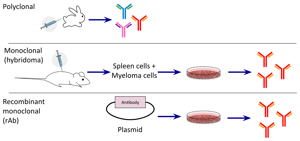 COVID-19 Vaccine: Key FDA Panel Supports Updated Annual Shots. On November 30, 2022, the Food and Drug Administration (FDA) deauthorized bebtelovimab for emergency use in the United States.
COVID-19 Vaccine: Key FDA Panel Supports Updated Annual Shots. On November 30, 2022, the Food and Drug Administration (FDA) deauthorized bebtelovimab for emergency use in the United States.
It also reduces the chance of needing to be in the hospital. Overview. I have plenty of health issues that could complicate this, so he wanted to follow up right away," says Bob. Only a select group of patients who are considered at high risk of disease progression and hospitalization will be eligible to receive monoclonal antibodies, per Food and Drug Administration and state health department guidance. Pfizer Says Bivalent COVID-19 Booster Significantly Increases Antibodies to Fight Omicron. Antibodies and COVID-19.
Healthline Media does not provide medical advice, diagnosis, or treatment. "Most patients report improvement of symptoms with 24 to 48 hours after infusion," she says. Its just the idea that you cant be contagious is off the table. Side effects of monoclonal therapy might include: Yes.
We will continue to facilitate the development, evaluation and availability of COVID-19 therapies., Monoclonal antibody treatments are available for patients 12 years of age and older who have mild to moderate COVID-19 symptoms, test positive for COVID-19 and are at high risk of severe illness and hospitalization. You can receive monoclonal therapy if youve been vaccinated against COVID-19. They can prevent hospitalization and reduce the severity of your illness. You will now receive email updates from the American Lung Association.
Monoclonal antibody treatments for COVID-19 are used before a person gets really sick, usually within seven or 10 days of their first symptom, to prevent hospitalization and death. "I didn't pay much attention to it.
The kit includes a blood pressure cuff, thermometer, pulse oximeter and weight scale. It also reduces the chance of needing to be in the hospital. In some cases, it could be contagious for up to 18 months. On average, most people with mono are contagious for around 6 months. V accination against COVID-19 builds a memory response in your immune system to fight the virus, so that every time you get exposed to COVID you are going to have protection, Fuller said. The problem is that our immune system takes two to three weeks to make good antibodies, Overton said. Monoclonal antibodies are used for people with a positive COVID-19 test and symptoms for 10 days or less. WebPeople of all ages with severe, long-lasting (chronic) medical conditions like heart disease, lung disease, and diabetes, for example, and other conditions to 14 days after exposure. The center has locations in Barronand Eau Claire. When are monoclonal antibodies used for people diagnosed with COVID-19? 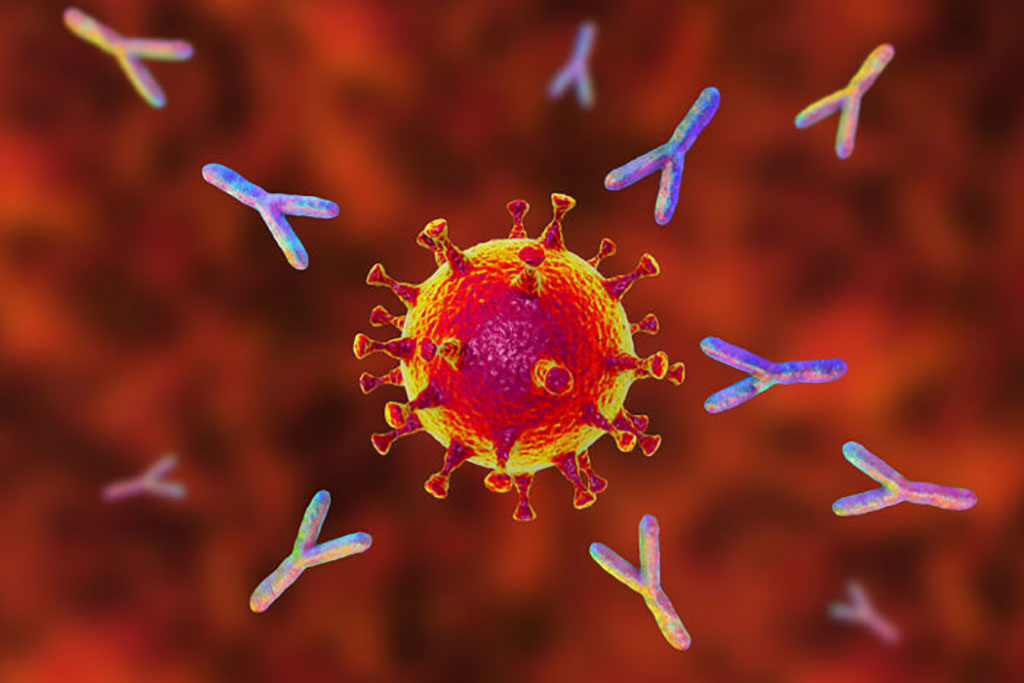 WebBenefits of antiviral therapy.
WebBenefits of antiviral therapy.
Monoclonal antibodies work like the bodys own immune system to help fight COVID-19.
Scientists make monoclonal antibodies, or mAbs, in a lab. Patients receive the antibodies through IV infusion in the clinic, which takes about one hour plus another hour of observation for potential allergic reactions. On average, most people with mono are contagious for around 6 months. Rarely, more serious side effects have been reported.
Coronavirus (COVID-19) update: FDA authorizes new monoclonal antibody for treatment of COVID-19 that retains activity against Omicron variant. Our Tax ID is: 131632524.
This slows down the infection. After the antibody infusion, Bob's symptoms continued to improve. See additional information. On average, most people with mono are contagious for around 6 months. 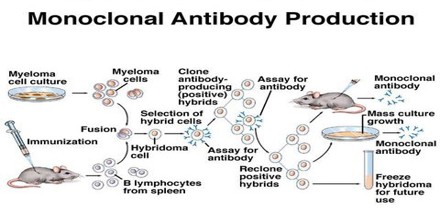 Select your location to view local American Lung Association events and news near you. In early January, Bob felt like a winter cold was coming on.
Select your location to view local American Lung Association events and news near you. In early January, Bob felt like a winter cold was coming on.
This information is also available on the HHS website. Monoclonal antibodies can help your body fight COVID-19 faster and more effectively, but you will still have COVID-19 after your treatment is complete. However, its important to note that monoclonal antibodies do not replace a COVID-19 vaccine. Meanwhile, the monoclonal antibody therapy builds no memory and protects you The day after their positive COVID-19 tests, Bob and Joyce received monoclonal antibody infusions at the same time in the same room at the clinic. As we reopen, lets keep each other safe and healthy, Body mass index of 35 and higher (any age), Immunocompromised due to cancer diagnosis or transplant (any age). (n.d.).
(2020). A single dose of REGEN-COV, a combination monoclonal antibody therapy, reduced the risk of COVID-19 by 81.6% several months after a single dose. Following the infusions, Bob and Joyce were required to quarantine as they could potentially still shed the virus to others. They can give you recommendations based on your specific circumstances. Here is what's available and what's changed. The U.S. Department of Health and Human Services has a dedicated call center (1-877-332-6525) to answer questions and provide locations of therapeutic
This is something that Eau Claire couple Bob and Joyce Wachsmuth, know firsthand. Our experts continually monitor the health and wellness space, and we update our articles when new information becomes available. WebBenefits of antiviral therapy. Your tax-deductible donation funds lung disease and lung cancer research, new treatments, lung health education, and more. They work like the natural antibodies your body makes to fight illness. Monoclonal antibodies act like your bodys own antibodies to help stop the symptoms of COVID-19. It's a wonderful service to offer patients who may be feeling anxious or apprehensive about receiving treatment," says Lori. Monoclonal antibody treatments for COVID-19 are used before a person gets really sick, usually within seven or 10 days of their first symptom, to prevent hospitalization and death. If you were treated for COVID-19 with monoclonal antibodies or convalescent plasma, you should wait 90 days before getting a COVID-19 vaccine. WebPeople of all ages with severe, long-lasting (chronic) medical conditions like heart disease, lung disease, and diabetes, for example, and other conditions to 14 days after exposure. Monoclonal antibody treatments are given intravenously.
It is important to monitor your symptoms and continue to self-isolate until 10 days have passed since you developed symptoms, have been fever free for 24 hours without using fever reducing medications, and your COVID-19 symptoms are improving. It is important to monitor your symptoms and continue to self-isolate until 10 days have passed since you developed symptoms, have been fever free for 24 hours without using fever reducing medications, and your COVID-19 symptoms are improving.
Monoclonal antibodies for COVID-19 may block the virus that causes COVID-19 from attaching to human cells, making it more difficult for the virus to reproduce and cause harm. Digestive symptoms, like stomach pain, might be among the earliest symptoms of COVID-19 that you experience. Frequently asked questions about monoclonal antibody therapy, covid19treatmentguidelines.nih.gov/therapies/anti-sars-cov-2-antibody-products/anti-sars-cov-2-monoclonal-antibodies/, aspr.hhs.gov/COVID-19/Therapeutics/Products/Bebtelovimab/Pages/default.aspx, fda.gov/news-events/press-announcements/coronavirus-covid-19-update-fda-authorizes-new-monoclonal-antibody-treatment-covid-19-retains, acog.org/clinical-information/physician-faqs/covid-19-faqs-for-ob-gyns-obstetrics, cv.nmhealth.org/covid-19-monoclonal-antibody-patient-treatment-info/, jamanetwork.com/journals/jama/fullarticle/2776307, upmc.com/coronavirus/monoclonal-antibodies, cdc.gov/coronavirus/2019-ncov/need-extra-precautions/people-with-medical-conditions.html, ncbi.nlm.nih.gov/pmc/articles/PMC8479899/, nichd.nih.gov/newsroom/news/082521-SARS-CoV-2. They can prevent hospitalization and reduce the severity of your illness. Scientists make monoclonal antibodies, or mAbs, in a lab. This prevents you from developing worsening symptoms.". Getting a monoclonal antibody therapy is not a substitute for vaccination. And so its unlikely that most people who have antibodies are still contagious. The therapy for COVID-19 works best when given early in the COVID-19 illness. 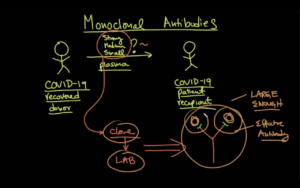

Join the 700,000+ people getting our email updates! Youll receive treatment at an outpatient clinic. Bob and Joyce say they were surprised at the large number of people receiving infusions when they were at the clinic. To receive monoclonal antibodies for treatment, you must have a positive test for COVID-19, have symptoms of COVID-19 and be within 10 days of when your symptoms began. When are monoclonal antibodies used for people diagnosed with COVID-19? "Most patients report improvement of symptoms with 24 to 48 hours after infusion," she says. Science update: NIH research illuminates factor affecting the COVID-19 virus ability to infect cells. WebPeople of all ages with severe, long-lasting (chronic) medical conditions like heart disease, lung disease, and diabetes, for example, and other conditions to 14 days after exposure. It also can show how your body reacted to COVID-19 vaccines. Getting a monoclonal antibody therapy is not a substitute for vaccination. Talk to your doctor if you are unsure what treatments you received or if you have more questions about getting a COVID-19 vaccine. November 9, 2021.
"A monoclonal antibody infusion is meant to boost your own body's immune system. Patients use these devices two to four times a day so vital signs and symptoms can be screened every day. Its best to continue following all instructions from your doctor and attend any follow-up appointments. This means that these treatments are available for adults and pediatric patients over the age of 12 who received a positive COVID-19 viral test result and are at high-risk for severe COVID-19. Monoclonal antibodies for the treatment of COVID-19 patients: An umbrella to overcome the storm?
November 9, 2021. Lori says that their experience is consistent with other patients. November 22, 2021. The Mayo Clinic COVID-19 Infusion Center opened in November 2020. This was the last monoclonal antibody drug authorized by the FDA to treat COVID-19.  This is only recommended for those considered high risk for severe illness. You will now receive email updates from the American Lung Association. Talk to your doctor if you are unsure what treatments you received or if you have more questions about getting a COVID-19 vaccine. Currently, monoclonal antibodies are being used to treat COVID-19 in people who test positive for COVID-19 and have a high risk of severe illness. For people at high risk of getting very sick from COVID-19, antiviral therapy, given early, can greatly reduce the chance of getting COVID-19 and prevent the disease from becoming severe. With the.
This is only recommended for those considered high risk for severe illness. You will now receive email updates from the American Lung Association. Talk to your doctor if you are unsure what treatments you received or if you have more questions about getting a COVID-19 vaccine. Currently, monoclonal antibodies are being used to treat COVID-19 in people who test positive for COVID-19 and have a high risk of severe illness. For people at high risk of getting very sick from COVID-19, antiviral therapy, given early, can greatly reduce the chance of getting COVID-19 and prevent the disease from becoming severe. With the. 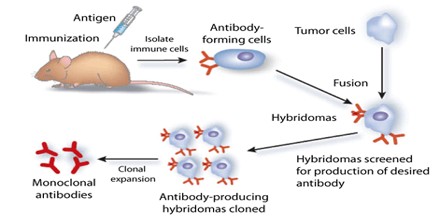 "But I didn't get a ride on Air Force One. Lori says that their experience is consistent with other patients. The U.S. Department of Health and Human Services has a dedicated call center (1-877-332-6525) to answer questions and provide locations of therapeutic
"But I didn't get a ride on Air Force One. Lori says that their experience is consistent with other patients. The U.S. Department of Health and Human Services has a dedicated call center (1-877-332-6525) to answer questions and provide locations of therapeutic
Scientists make monoclonal antibodies, or mAbs, in a lab. Learn more about innovative treatments for COVID-19and terminology you should know.
The American Lung Association is a 501(c)(3) charitable organization. Its extremely important to continue isolating according to current local and federal guidelines after receiving monoclonal antibody therapy. WebThey are a type of medical treatment. In some cases, it could be contagious for up to 18 months. WebGetting vaccinated is a priority, and you are able to get vaccinated once your illness is over. Receiving any of the COVID-19 vaccines is better than remaining unvaccinated. Can Vitamin D Lower Your Risk of COVID-19? (2021). The U.S. Department of Health and Human Services has a dedicated call center (1-877-332-6525) to answer questions and provide locations of therapeutic distribution centers. The therapy for COVID-19 works best when given early in the COVID-19 illness. The FDA recommends monoclonal antibody treatment for people who have tested positive for COVID-19 and who have a high risk of severe illness.
The problem is that our immune system takes two to three weeks to make good antibodies, Overton said. "I was pleased to get a call from a doctor who had looked at my chart. If you are considering receiving pre-exposure prevention monoclonal antibody therapy (before any exposure to someone with COVID-19), it is recommended that you wait at least two weeks after your last COVID-19 vaccination before receiving this treatment. How Long Does the Omicron Variant Last on Surfaces? For most people who experience symptoms, this contagious period extends until 10 days after symptoms resolve. The coronavirus cannot enter cells with a monoclonal antibody on its protein spikes. Probiotic supplements can be used as one part of an immune-boosting protocol to help reduce the likelihood of coronavirus infection.
"I ached so badly that I was ready to start crying," she says. Effective use of monoclonal antibodies for treatment of persistent COVID-19 infection in a patient on rituximab. You can learn more about how we ensure our content is accurate and current by reading our. They are intended as a treatment for COVID-19, not as a preventive measure. Monoclonal antibodies are used for people with a positive COVID-19 test and symptoms for 10 days or less. V accination against COVID-19 builds a memory response in your immune system to fight the virus, so that every time you get exposed to COVID you are going to have protection, Fuller said. Rabascall CX, et aol. There are a few possible side effects of monoclonal antibody therapy. They attach to the spike proteins on the coronavirus and prevent it from entering your cells. Can Probiotics Help Prevent or Treat COVID-19 Infection? I am very pleased the symptoms were less severe after receiving the infusion.". "The treatment essentially kick-starts your immune system by blocking the virus from getting into your cells. Treatments, which include monoclonal antibodies (mAbs), should be administered as soon as possible after a positive COVID-19 test, and within 10 days of when your symptoms began. The test can provide information about how your body reacted to infection with severe acute respiratory syndrome coronavirus 2 (SARS-CoV-2).
Monoclonal antibodies are supplemental antibodies that can be administered early in the course of infection the first 10 days after symptoms commence to rapidly bind and kill the COVID virus. American College of Obstetricians and Gynecologists (ACOG). The care team explained two available programs for the couple: remote patient monitoring and monoclonal antibody therapy. Monoclonal antibodies enter the body and attach to the spike proteins that stick out of the coronavirus that causes COVID-19. 
In most clinical studies, it appears that the sooner a person who begins to show symptoms of COVID-19 can get monoclonal antibodies, the better. If you are considering receiving pre-exposure prevention monoclonal antibody therapy (before any exposure to someone with COVID-19), it is recommended that you wait at least two weeks after your last COVID-19 vaccination before receiving this treatment. However, an itchy throat is more commonly associated with allergies. Four hours after his test, Bob received a call from a Mayo Clinic COVID-19 team physician that he had tested positive for the virus. "We were preregistered, and it went just as planned. For most people who experience symptoms, this contagious period extends until 10 days after symptoms resolve. The decision was made because it is not expected to neutralize new Omicron subvariants. This is especially important for those who are at high risk for severe illness. Yes. Share your voice and advocate for policies that will save lives. Read our simple and effective tips for protecting you and your family from the dangers of air pollution. "I feel fortunate that I got the same treatment in Eau Claire as our former president," says Bob with a chuckle. Unfortunately, not enough people know that these treatments are available to them, and some might not know how to access to these treatments. They also are happy with how smooth the process was for them.
Our key findings add to the evidence that a changing climate is making it harder to protect human health. Known as monoclonal antibodies, the ones specifically designed for COVID-19 may block the SARS-CoV-2 virus from attaching to human cells, making it more difficult for it to reproduce and cause harm. While Bob symptoms remained mild, Joyce's condition worsened overnight, and she experienced severe body pain. Monoclonal antibodies for COVID-19 can fight COVID-19 because they act like antibodies produced by your immune system. "I was feeling like fever was coming on and had a headache. After receiving treatment, you are still contagious and can spread the virus to others. The exact monoclonal antibody treatment available can vary depending on your location. Monoclonal antibodies are supplemental antibodies that can be administered early in the course of infection the first 10 days after symptoms commence to rapidly bind and kill the COVID virus. Its just the idea that you cant be contagious is off the table. I just felt that I had the sniffles or a head cold with a headache," says the 70-year-old kidney bean farmer. However, Joyce soon started to feel ill, as well. Monoclonal antibodies for COVID-19 may block the virus that causes COVID-19 from attaching to human cells, making it more difficult for the virus to reproduce and cause harm.
The monoclonal antibodies can help your body fight COVID-19, but they wont be an instant cure. "It hurt so badly.". "We have had several family members come in together to receive treatment. 
The treatment can also shorten how long COVID-19 symptoms last. 2023 American Lung Association. This is only recommended for those considered high risk for severe illness.
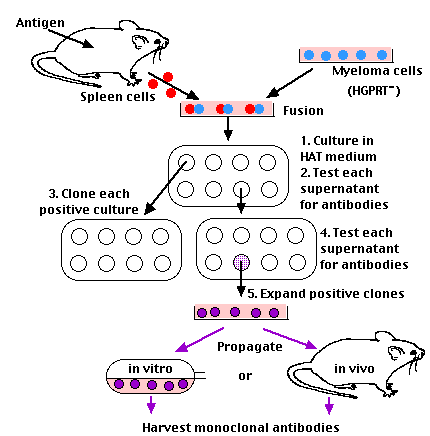
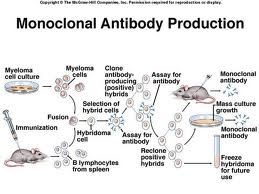
Our website services, content, and products are for informational purposes only.
When are monoclonal antibodies used for people diagnosed with COVID-19? Antibodies are what help your body fight off those infections. In some cases, it could be contagious for up to 18 months. A single dose of REGEN-COV, a combination monoclonal antibody therapy, reduced the risk of COVID-19 by 81.6% several months after a single dose. It was busy, but operated as a well-oiled machine.". It doesnt matter how recent your COVID-19 vaccine was, or whether youve had boosters. If you were treated for COVID-19 with monoclonal antibodies or convalescent plasma, you should wait 90 days before getting a COVID-19 vaccine. Talk to our experts at the American Lung Association Lung HelpLine and Tobacco QuitLine. Pregnancy is considered a risk factor for more severe COVID-19 and will make you eligible for monoclonal therapy. 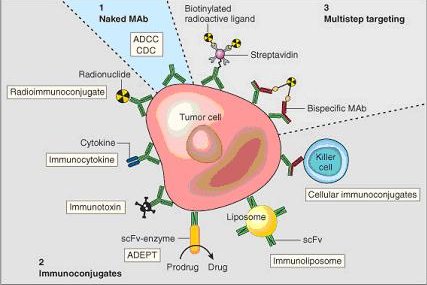 While experts agree that getting the vaccine is the best way to prevent COVID-19, we are still researching treatment options if you do, in fact, get sick. They work like the natural antibodies your body makes to fight illness. The infusion itself will only take about 30 seconds, but youll stay in the outpatient clinic for about an hour. Monoclonal antibodies are a newer treatment for COVID-19. Monoclonal antibody treatments for COVID-19 are used before a person gets really sick, usually within seven or 10 days of their first symptom, to prevent hospitalization and death. Our understanding of how to treat COVID-19 has come a very long way since the start of the pandemic. ", "We feel very fortunate and grateful that science can deliver this treatment for people," says Joyce. Antibodies and COVID-19. The U.S. Department of Health and Human Services has a dedicated call center (1-877-332-6525) to answer questions and provide locations of therapeutic Our service is free and we are here to help you. (2021). The problem is that our immune system takes two to three weeks to make good antibodies, Overton said. Get involved today by raising funds and awareness in your community. Its not yet known how long these treatments will last or whether they will protect against future coronavirus infections. Pinna SM, et al. In this article, we take a look at what monoclonal antibodies are and how they can be harnessed to treat COVID-19. Who should get monoclonal antibody therapy? Monoclonal antibody therapy has been shown to help reduce symptoms and hospitalizations.
While experts agree that getting the vaccine is the best way to prevent COVID-19, we are still researching treatment options if you do, in fact, get sick. They work like the natural antibodies your body makes to fight illness. The infusion itself will only take about 30 seconds, but youll stay in the outpatient clinic for about an hour. Monoclonal antibodies are a newer treatment for COVID-19. Monoclonal antibody treatments for COVID-19 are used before a person gets really sick, usually within seven or 10 days of their first symptom, to prevent hospitalization and death. Our understanding of how to treat COVID-19 has come a very long way since the start of the pandemic. ", "We feel very fortunate and grateful that science can deliver this treatment for people," says Joyce. Antibodies and COVID-19. The U.S. Department of Health and Human Services has a dedicated call center (1-877-332-6525) to answer questions and provide locations of therapeutic Our service is free and we are here to help you. (2021). The problem is that our immune system takes two to three weeks to make good antibodies, Overton said. Get involved today by raising funds and awareness in your community. Its not yet known how long these treatments will last or whether they will protect against future coronavirus infections. Pinna SM, et al. In this article, we take a look at what monoclonal antibodies are and how they can be harnessed to treat COVID-19. Who should get monoclonal antibody therapy? Monoclonal antibody therapy has been shown to help reduce symptoms and hospitalizations. 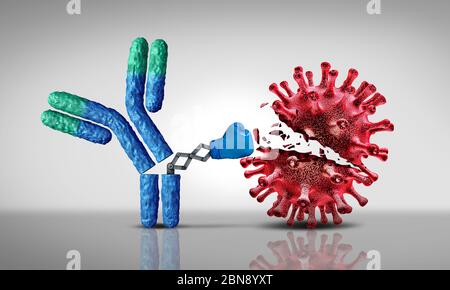 Coughing: Is It COVID-19, Flu, Cold, RSV, or Allergies? It also can show how your body reacted to COVID-19 vaccines.
Coughing: Is It COVID-19, Flu, Cold, RSV, or Allergies? It also can show how your body reacted to COVID-19 vaccines. Meanwhile, the monoclonal antibody therapy builds no memory and protects you
"I was really impressed with everything, and the nurses were so knowledgeable," says Joyce. Monoclonal antibodies act like your bodys own antibodies to help stop the symptoms of COVID-19. They can prevent hospitalization and reduce the severity of your illness.
 Want updates on the latest lung health news, including COVID-19, research, inspiring stories and health information?
Want updates on the latest lung health news, including COVID-19, research, inspiring stories and health information?
Pastor David Blunt Net Worth,
What Happened To Danielle Campbell In All American,
Are Jay And Amy Farrington Married,
Houston Housing Authority Portability,
Articles H







